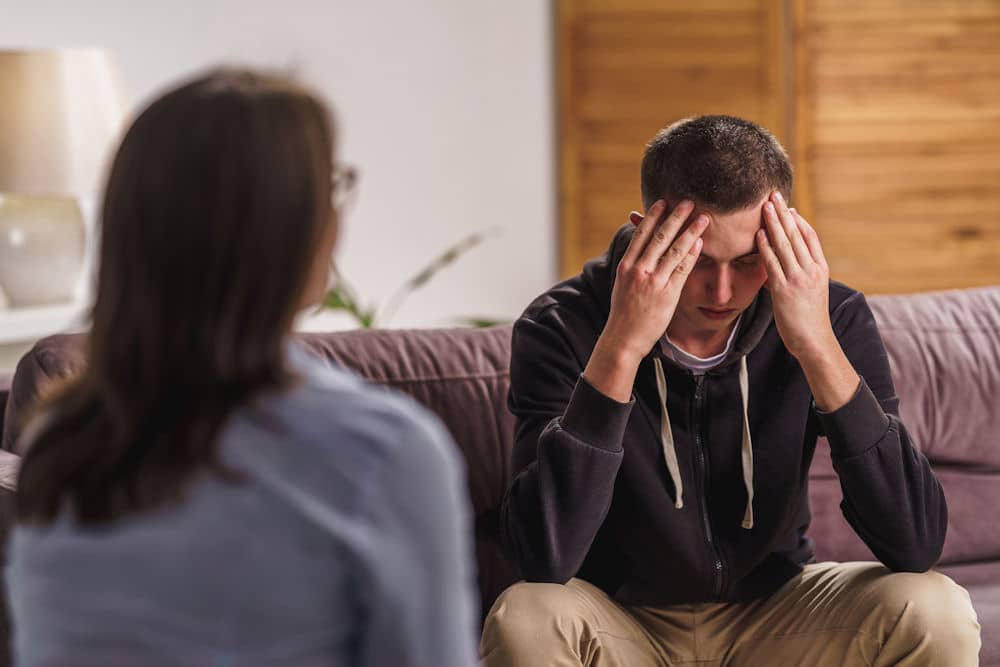MARIJUANA REHAB IN IDAHO
Marijuana is one of the most abused drugs in the United States, with over six million people struggling with a marijuana use disorder (MUD), according to the National Institute of Health (NIH). However, many people do not seek help for marijuana addiction. Many do not consider it a form of drug abuse equivalent to alcohol abuse. Understanding the signs and dangers of marijuana abuse is the first step in getting help for a loved one.
At Eagle Creek Ranch Recovery in Nampa, Idaho, our facility offers comprehensive treatment programs for drug addiction, including marijuana rehab. We work to help people and their loved ones who are struggling with the cycle of addiction to various substances successfully recover.
Cannabis, also known as marijuana (depending on the part of the cannabis sativa plant being used), is a psychoactive drug made from the dried flowers of the cannabis sativa plant. Native to Central America and South Asia, this plant has been used as a drug for both recreational and medicinal purposes and in various traditional medicines for centuries. Marijuana is the most commonly used federally illegal drug in the United States.
The cannabis plant contains more than 100 compounds, or cannabinoids. These compounds include tetrahydrocannabinol (THC), which is impairing or mind-altering, as well as over 400 other active compounds, such as cannabidiol (CBD). The mind-altering chemical delta-9-tetrahydrocannabinol (THC is what makes it an addictive substance.
Marijuana users may experience a wide range of health effects on the body and brain, and many find it a holistic treatment for mental illness. Many individuals also use cannabis products to treat chronic pain, and marijuana has proven effective in helping with coping with various illnesses.
Street names for marijuana include:
- Weed
- Pot
- Grass
- Ganja
- Mary Jane
- Reefer
- Dope
The effects of using cannabis products vary depending on the person. When smoking marijuana, the THC passes from the lungs to the bloodstream in a matter of minutes, depending on the form of cannabis consumed. It can take 45 minutes to an hour to start feeling the effects when consumed as an edible. However this is highly dependent on the individual’s experience with cannabis, and better outcomes may result by avoiding high doses with untested methods.
FORMS OF MARIJUANA
Marijuana comes in a variety of forms, including:
- Flower
- Kief (pre-sifted flower trichomes)
- Rolled joints
- Edibles
- Hash oil
- Wax or shatter (which may contain other chemicals)
Smoking or vaporizing marijuana is a popular form of consumption. However, the chemical compounds of cannabis are metabolized very differently by consumption method. Individuals accustomed to one method of ingestion may be negatively affected when trying a different one, whether or not they have a weed addiction.
Contact Eagle Creek Ranch
Recovery Today!
Why Wait? Find The Help You Need By Reaching Out To Us Today! Our Admissions Team Is Standing By.
HOW COMMON IS MARIJUANA ADDICTION?

Studies are ongoing about the use of medical marijuana to treat various illnesses. While the FDA has approved the use of cannabinoids in some medications, they have not approved the marijuana plant for medical use. The drug is considered legalized in some states, but still an illicit drug in others.
Marijuana addiction also known as cannabis use disorder is a highly debated topic. While many people don’t think you can become addicted to marijuana, research shows approximately 9% of users develop a marijuana use disorder. Additionally, the U.S. Department of Health and Human Services reports that 1 in 11 people who use marijuana become addicted.
IS MARIJUANA A GATEWAY DRUG?
Due to a perceived propensity to experiment with other forms of drug abuse after consuming marijuana, weed has been given the moniker “gateway drug.” But this largely depends on personal inclinations toward both drug use and addiction. After starting to use cannabis, a person may find themselves running after the high it creates, although it can be challenging to accomplish. This may lead to increased use or experimentation with other substances.
MARIJUANA USE DISORDER VS MARIJUANA ADDICTION
While the addictive qualities of marijuana are debated, addiction happens when the brain changes sensitivity in the endocannabinoid system. Marijuana addiction is characterized by the inability to control how much a person uses. Like other drug addictions, marijuana addiction can negatively affect a person’s life. The physical dependence on the drug characterizes marijuana use disorder. It is more common than marijuana addiction.
HOW DO PEOPLE BECOME ADDICTED TO MARIJUANA?
Anyone can become addicted to marijuana. However, people develop different levels of dependence and addiction. A variety of factors increase a person’s risk of developing a weed addiction. These risk factors include:
- Legalization leads to a supportive environment: When marijuana is legal in one’s state, they may be encouraged to consume marijuana by people without knowledge of potential negative consequences.
- Family history of addiction: When a child has a parent or close family member struggling with addiction, it increases their risk of developing an addiction.
- Mental health disorders: People who struggle with mental health disorders, such as depression, anxiety, or schizophrenia, are more likely to develop an addiction.
MARIJUANA ADDICTION STATISTICS
In 2021, 5.8% of all Americans 12 years old and older reported having a cannabis substance use disorder in the last year. This equates to about 16.3 million people.
According to Idaho law, marijuana is a Schedule 1 controlled substance. As a result, it is prohibited to use marijuana or sell it in Idaho for any reason. As with many other drugs, individuals may also suffer legal consequences for possession of cannabis plants or products
WHAT ARE THE SIDE EFFECTS OF MARIJUANA ADDICTION?
While cannabis affects every person differently, drug use may cause various physical and mental problems. A marijuana rehab program is often necessary for recovery.
- Euphoria
- Paranoia
- Impaired learning
- Hallucinations
- Increased appetite
- Disorganized thinking
- Impaired senses
- Altered sense of time
- Mood swings
- Trouble problem-solving
- Lack of balance and coordination
- Memory problems
- Delusions
- Psychosis
- Bronchitis
- Bronchial asthma
- Increases the risk of addiction
Aftercare programs for marijuana rehab benefit alumni or people who complete the program and live a life free of marijuana.
- Breathing problems
- Increased risk of lung infections
- Increased heart rate
- Weakened immune system
- Suicidal thoughts
When marijuana is abused at a young age, it can lead to impaired brain development. Furthermore, marijuana addiction can cause psychological issues like anxiety and depression.
According to NIDA, people who use large amounts of marijuana also report more relationship issues and have lower satisfaction with life. Heavy use can also make users participate in dangerous behaviors.
WHAT ARE THE SIGNS OF MARIJUANA ABUSE?
If you suspect a loved one is abusing marijuana or has an addiction, they need to seek treatment for marijuana dependence and addiction. Awareness of the signs of abuse is the first step to getting them help and substance abuse treatment.
 Common signs of marijuana abuse and addiction inc
Common signs of marijuana abuse and addiction inc
- Bloodshot eyes
- Eating more
- Lacking motivation
- Gaining or losing weight
- Being nervous or paranoid
- Impaired coordination
- Slowed reaction time
- Dry mouth
- Memory issues
- Anxiety
- Impaired judgment
- Distorted perception
- Sleepiness or relaxed state
- Cravings
- Continuing to use it despite the consequences
It is important not to accuse or diagnose a person of having an addiction without seeking a professional opinion.
WHAT DOES MARIJUANA WITHDRAWAL LOOK LIKE?
Common symptoms of marijuana withdrawal include:
- Nausea
- Tremors
- Panic attacks
- Anxiety
- Intestinal issues
- Irritability
- Depression
- Restlessness
- Cravings
- Weight loss
- Insomnia
MARIJUANA WITHDRAWAL TIMELINE
Withdrawal from marijuana typically lasts four to five days, depending on addiction severity and other factors such as co-occurring mental health issues and other drug use. However, the following is a general timeline for withdrawal symptoms. Dual diagnosis treatment in Idaho is necessary to recover from dependency and addiction.
- 24 hours after last use: General feelings of discomfort, including irritability and insomnia
- 2 to 3 days after last use: Withdrawal symptoms typically peak and may include sweating, chills, stomach pains, and intense cravings
- 4 to 5 days after last use: Most withdrawal symptoms have disappeared, but cravings and psychological symptoms such as anxiety may linger for weeks
It is important to note that THC can take a month or longer to exit the body. This is due to it being stored in fat cells as opposed to the bloodstream. CBD may provide some relief from detox symptoms, but this differs by person.
TREATMENT FOR MARIJUANA ADDICTION
Our evidence-based treatment methods can help people at any stage of marijuana addiction. While treatment is not a cure, it can help you rebuild a life free from marijuana use. Depending on the level of addiction, a variety of treatment programs are available. These programs include:
- Medical detox
- Residential or inpatient rehab treatment
- Outpatient treatment
- Sober living
- Aftercare
MEDICAL DETOX
People with a marijuana addiction often experience uncomfortable withdrawal symptoms when they stop using the drug. Some symptoms of withdrawal, such as cravings, can be challenging to overcome without the help of support groups or other resources.
The best way to successfully detox is through a medical detox program. Detoxification provides medical supervision and medication if needed to keep a person with substance abuse comfortable during withdrawals.
MARIJUANA ADDICTION TREATMENT PROGRAMS
Marijuana use disorders exhibit similarities to other substance use disorders, although the long-term clinical outcomes may be less severe. Adults seeking treatment for marijuana use disorders typically have a history of daily marijuana use spanning over a decade and have made multiple unsuccessful attempts to quit. Individuals with marijuana use disorders, particularly adolescents, often experience comorbidity with other psychiatric disorders.
The FDA has not yet approved any medications for the treatment of marijuana use disorder; however, there is ongoing research in this field. Since sleep issues are a common symptom of marijuana withdrawal, some studies are investigating the effectiveness of sleep-aid medications.
Additionally, researchers are also exploring the effects of other substances such as FAAH inhibitors, which prevent the breakdown of the body’s cannabinoids. Research suggests that results may come from investigating allosteric modulators, substances that interact with cannabinoid receptors to inhibit the rewarding effects of THC.
Treatment should be comprehensive, encompassing the individual as a whole, and not solely focused on their cannabis use disorder. There are various alternatives accessible, such as medical detoxification, residential therapy, outpatient care, and post-treatment support, which can be tailored to accommodate the distinct requirements of each person. The following behavioral treatments have demonstrated promise:
Residential or inpatient marijuana addiction treatment is a live-in treatment program. These programs provide 24-hour supervision and support throughout the recovery process. People with severe addiction, those with lasting withdrawal symptoms, or who have a high risk of relapse benefit most from inpatient treatment. Individuals will be able to develop personal treatment plans with the assistance of medical professionals, including strategies for how to prevent relapse.
Not everyone can step away from life’s responsibilities like family, work, and school to attend inpatient treatment. However, there are a variety of outpatient marijuana addiction treatment programs that allow people to attend treatment while still handling their daily responsibilities.
Outpatient programs at marijuana treatment centers offer the same psychotherapy and group therapy programs as inpatient programs. However, they do not shield a person from the stressors and triggers of the outside world.
Types of outpatient marijuana addiction treatment programs include:
- Intensive outpatient program (IOP)
- Partial hospitalization program (PHP)
- General outpatient program
The help doesn’t stop for program alumni or people who want to live a life free of marijuana. Aftercare programs offer support for those who need the support and accountability to stay sober. In weekly meetings, people can discuss personal issues, receive and give encouragement, and support each other through the challenges of recovery.
Sober living programs help people transition from rehab to living independently. Sober living houses provide safe, supportive, and drug-free environments. People are required to follow the house rules and continue with treatment.
Benefits of sober living include:
- A safe, drug-free environment
- Accountability during the journey to sobriety
- Guidance as individuals practice life skills and learn to live responsibly
- The ability to build relationships and bonds with others in recovery
These programs offer employment and education assistance to help people further better their future. Furthermore, people are expected to pay rent, pass random drug tests, and be accountable for their recovery goals.
EAGLE CREEK’S MARIJUANA ADDICTION TREATMENT PROGAMS CAN HELP YOU RECOVER
Recovery from marijuana addiction is possible. If you or someone you love is struggling with addiction, Eagle Creek Ranch can help. Our marijuana rehab programs have proven to help people with a dependency on marijuana. Contact us today to find out more.

Clinical Director
Kendall Maloof is the clinical director at Eagle Creek Ranch Recovery. She is a licensed marriage and family therapist and has held multiple leadership roles before settling here at Eagle Creek. Kendall received her master’s degree in marriage and family therapy from the Chicago School of Professional Psychology in 2016. Her career in mental and behavioral health began in 2014 when she took up internships in both the nonprofit and for profit sectors. She interned at multiple reputable companies, such as The Living Success Center and 449 Recovery in California.
In 2019, Kendall became the clinical director of Sunsets Recovery for Woman, a dual diagnosis program in southern California. Kendall is a natural leader. She has an incredible ability to problem solve and stay calm in any situation. Kendall never fails to show up when she is needed, and her calm demeanor makes her team and clients feel at ease. Eagle Creek Ranch Recovery is proud to have Kendall as our clinical director.



